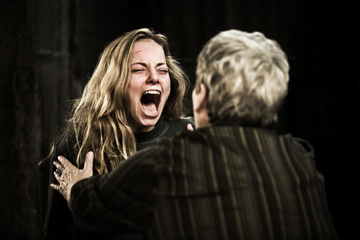 The state of the world today is upsetting enough, so what’s the point in paying $10 to heighten one’s misery? What’s the upside in spending ninety minutes to watch a group of nubile ingénues get sliced up in gorily inventive ways when one need only listen to a few minutes of conservative talk radio to be reminded that humanity is held cheap in 2007? Nastiness is all around us. Lives are being lost at an alarming rate in Darfur, Iraq and Afghanistan. "Karma Police" keeps getting covered. How can anyone be looking forward to a major motion picture centered on thrill killing?
The state of the world today is upsetting enough, so what’s the point in paying $10 to heighten one’s misery? What’s the upside in spending ninety minutes to watch a group of nubile ingénues get sliced up in gorily inventive ways when one need only listen to a few minutes of conservative talk radio to be reminded that humanity is held cheap in 2007? Nastiness is all around us. Lives are being lost at an alarming rate in Darfur, Iraq and Afghanistan. "Karma Police" keeps getting covered. How can anyone be looking forward to a major motion picture centered on thrill killing?
To celebrate our merry Demon Drop down the abyss, I’ve compiled a list of five movies designed to jar the senses, scar the psyche and send you fleeing the theater for the rough, but comparatively forgiving embrace of reality. One caveat: most movies lose their ability to shock when viewed at home. Even when presented via the most tricked-out home theater imaginable, you’ve still got the home field advantage; you can hit "stop" at any time, whereas, in a commercial movie house, you’ll have to bear the shame of walking over people to seek relief for your fragile sensibilities. This, then, accounts for the absence of endurance tests like I Spit on Your Grave, Funny Games and Inland Empire, all of which I watched in the comfort of my own living room. This isn’t to say I enjoyed them, but it’s hard to be consistently engaged when you’ve got a cat sitting on your lap and your upstairs neighbors are fucking like it’s the end of the world.
Now, here comes the pain…
Henry: Portrait of a Serial Killer (1986, d. John McNaughton)
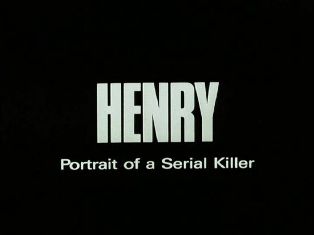 The serial killer genre has become so fashionable and so cliché-ridden that it’s easy to forget there was a time when the bluntly objective depiction of a warped mind could shake our (admittedly anodyne) belief in the innate goodness of man. Directed by an inspired John McNaughton (who waged a protracted and, ultimately, losing battle with the MPAA to secure an R rating), Henry unnerves because it so matter-of-factly drops us into the suzzy milieu of its protagonist and his even more disgusting sidekick, Otis (who’s easily the most repugnant character in the film on account of the immense pleasure he derives from their murderous deeds), and denies us a moral center. The only halfway sympathetic character in the movie is Otis’s sister, Becky, but she’s too stupid and pathetic to offset the vile nature of the two killers.
The serial killer genre has become so fashionable and so cliché-ridden that it’s easy to forget there was a time when the bluntly objective depiction of a warped mind could shake our (admittedly anodyne) belief in the innate goodness of man. Directed by an inspired John McNaughton (who waged a protracted and, ultimately, losing battle with the MPAA to secure an R rating), Henry unnerves because it so matter-of-factly drops us into the suzzy milieu of its protagonist and his even more disgusting sidekick, Otis (who’s easily the most repugnant character in the film on account of the immense pleasure he derives from their murderous deeds), and denies us a moral center. The only halfway sympathetic character in the movie is Otis’s sister, Becky, but she’s too stupid and pathetic to offset the vile nature of the two killers.
Michael Rooker’s dead-eyed performance as Henry should distance the viewer, but his vacant persona actually draws us in; for whatever reason, we want to see if there’s a flicker of humanity somewhere in this monster. This active involvement only compounds the awfulness of the film’s notorious set-piece: Henry’s and Otis’s videotaped killing of an entire family. It’s at this point that the viewer feels complicit. Once the film reaches its inevitably nihilistic terminus, the only reaction is guilt; you leave the theater asking yourself, "Why?" Roger Ebert nails it when he described the debate following a screening of Henry at the Telluride Film Festival: "The division seemed to be between those who felt the film did its job brilliantly, and those who felt its job should not have been done at all." I’m still not sure where I stand.
The Descent (2005, d. Neil Marshall)
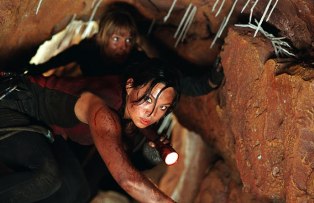 Call me a pussy if you must, but a) I’ve got selective claustrophobia, and b) I was infuriated by the rampant idiocy of the characters in this movie. I mean, what better way to take your best friend’s mind off the accident that killed her husband and daughter than to go spelunking, sans map, in a vast, unstable cave system?
Call me a pussy if you must, but a) I’ve got selective claustrophobia, and b) I was infuriated by the rampant idiocy of the characters in this movie. I mean, what better way to take your best friend’s mind off the accident that killed her husband and daughter than to go spelunking, sans map, in a vast, unstable cave system?
This is actually a clever (if obvious) move on director Neil Marshall’s part; by asking the viewer to identify with the weakest, most psychologically damaged member of the group, he puts us in a bad place before consigning us to the cramped darkness. Adding in a group of predatory mutants is really just piling on. I still don’t know whether I’d classify The Descent as a "thrill ride" or an "instrument of torture"; all I know is that it’s one of a handful of movies so intense that I actually had to look away from the screen in order to regain my bearings. Generally, I love being scared out of my wits, but the exhilaration that should accompany the rush of cinematically-induced terror never showed up. Instead, I just squirmed in my seat, waiting for the movie to end.
Audition (1999, d. Takashi Miike)
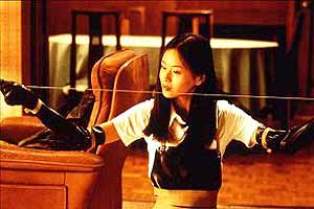 This remains the only instance where Japanese provocateur Takashi Miike applied himself sedulously enough to make a coherent, engaging and truly disturbing motion picture. In a way, I’m happy he hasn’t regained his focus; one Audition is enough for this lifetime. But great filmmaking is great filmmaking, and, even though it drives you to the brink (especially if you’re male), I’d rather Miike take his time to deliver something as indelible as Audition (or , in a lesser sense, Imprint) then rush out two or three disposable movies a year. He’s dangerous when locked in.
This remains the only instance where Japanese provocateur Takashi Miike applied himself sedulously enough to make a coherent, engaging and truly disturbing motion picture. In a way, I’m happy he hasn’t regained his focus; one Audition is enough for this lifetime. But great filmmaking is great filmmaking, and, even though it drives you to the brink (especially if you’re male), I’d rather Miike take his time to deliver something as indelible as Audition (or , in a lesser sense, Imprint) then rush out two or three disposable movies a year. He’s dangerous when locked in.
Audition is particularly shocking if you come to it with a basic understanding of Miike’s work; I just remember that I had seen Dead or Alive a few months prior, and had trouble believing a director capable of such lunatic excess could pull off something as nuanced and poignant as Audition‘s first act. Ignorance is also key to being properly bulldozed by this film, and, once the buzz kicked up, I had been careful to avoid any involved plot summaries. Lucky me. To this day, when I write about Audition, I instinctively shy away from discussing the conclusion (which drove a number of professional critics out of the Film Forum press screening I attended back in 2001); I want everyone to suffer as I have. But while the ending leaves you in a very bad place, the anguish it evokes is completely earned; once you catch your breath and have a drink or four, you’ll have plenty to mull over. And yet I’m totally cool with having seen Audition only twice. My masochism has a limit.
Irreversible (2002, d. Gaspar Noe)
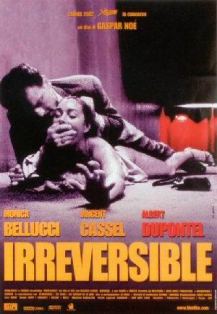 That limit does not apply to Irreversible, which I saw three times the weekend it opened. The best film of 2002 was also the most difficult to sit through for a number of reasons: the camerawork is aggressively disorienting (constantly gliding and spinning), the opening sequence (set in a gay nightclub subtly called The Rectum) climaxes with one of the most disturbing acts of violence ever put to film and, not for nothing, the sound design features a low-frequency thrum calibrated to induce physical and mental duress. Oh, and once this is all over, you’re treated to a nine-minute rape sequence.
That limit does not apply to Irreversible, which I saw three times the weekend it opened. The best film of 2002 was also the most difficult to sit through for a number of reasons: the camerawork is aggressively disorienting (constantly gliding and spinning), the opening sequence (set in a gay nightclub subtly called The Rectum) climaxes with one of the most disturbing acts of violence ever put to film and, not for nothing, the sound design features a low-frequency thrum calibrated to induce physical and mental duress. Oh, and once this is all over, you’re treated to a nine-minute rape sequence.
Had those who walked out of the film (and their numbers are legion) gutted it out through the rough stuff, they would’ve discovered that the film calms down as it moves further back in time (appropriate since Noe’s whole gimmick is that, for the most part, this is a traditional revenge narrative played in reverse). For my part, knowing that there was a moral purpose* to the ugliness of the first half-hour allowed me to stomach what I might’ve jeered had Irreversible unspooled conventionally (actually, it’s the final sequence in the park scored to the second movement of Beethoven’s 7th Symphony that kept me coming back), but no matter how prepared I was for the violence, it still tested my resolve. I’m sure the sound design had nothing to do with it.
Sphere (1998, d. Barry Levinson)
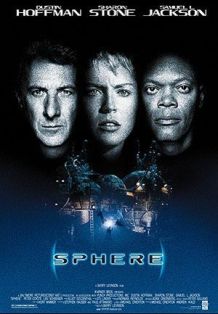 The movie that nearly drove me mad. Though I knew going in that Sphere was supposed to be garbage, it took place at the floor of the ocean (underwater movies are a fascination of mine) and was rumored to have a sea monster of some sort. I paid to see DeepStar Six and Leviathan in the theater; how bad could Levinson’s version of same be?
The movie that nearly drove me mad. Though I knew going in that Sphere was supposed to be garbage, it took place at the floor of the ocean (underwater movies are a fascination of mine) and was rumored to have a sea monster of some sort. I paid to see DeepStar Six and Leviathan in the theater; how bad could Levinson’s version of same be?
The apocalyptic, unremitting headache set in during one of Dustin Hoffman’s and Sharon Stone’s myriad arguments (aside from Queen Latifah being killed by jellyfish, those two screaming at each other is almost all I remember from this movie); it finally went away two days later. In the intervening period, I thought I might go blind from the pain. In retrospect, I probably should’ve walked out of the movie, but the damage was done, and, besides, there was something captivatingly awful about Sphere. At least, there must’ve been, because the entire audience hung around for the whole 130 minutes, openly berating the film through to the closing credits, and then hanging around in the lobby for an impromptu postmortem with complete strangers. I remember standing next to an escalator conversing with an older, well-heeled couple from the Upper West Side; all three of us were at a loss to explain a) what had happened to Levinson’s career, b) why we paid non-matinee prices to watch a Michael Crichton movie and c) how we stuck it out for the entire running time. Sphere isn’t just one of the very worst movies I’ve ever seen; it may also be a finely tuned torture device. To hell with chicks being hung upside down naked and getting their throats slashed, this is the product of inhumane minds. Only the studio development process could produce something this glowingly evil.
*Antonin Artaud would probably have loved Irreversible. If you’re not familiar with Artaud, here he is in his own words:
"The Theatre of Cruelty has been created in order to restore to the theatre a passionate and convulsive conception of life, and it is in this sense of violent rigour and extreme condensation of scenic elements that the cruelty on which it is based must be understood. This cruelty, which will be bloody when necessary but not systematically so, can thus be identified with a kind of severe moral purity which is not afraid to pay life the price it must be paid."